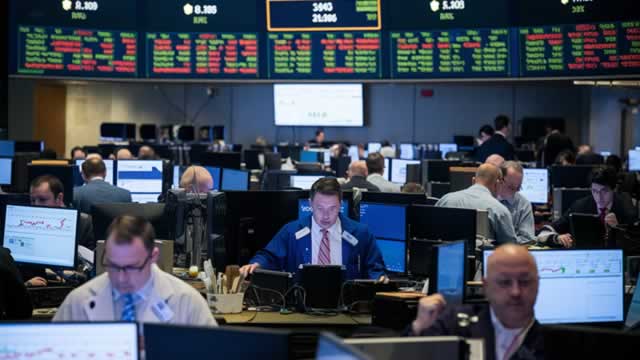Stock Market Turmoil: U.S. Tariffs Rattle the Global Economy
The U.S. stock market experienced a significant sell-off in recent days, with most global markets following suit. The Dow Jones Industrial Average (DJIA) and the S&P 500 index both saw substantial declines, with the DJIA dropping by over 600 points at one point. This market volatility was primarily driven by rising tensions between the U.S. and its trading partners, as the U.S. imposed new tariffs on a range of imports.
Global Markets Feel the Brunt of U.S. Tariffs
The sell-off in the U.S. stock market was not an isolated event. Markets around the world also felt the impact of the U.S. tariffs. The European stock market, for instance, saw its worst day in over two years, with the Euro Stoxx 50 index dropping by over 3%. Asian markets were similarly affected, with the Japanese Nikkei 225 index experiencing its largest one-day percentage decline in over a year.
A Few Markets Buck the Trend
Despite the widespread market sell-off, there were a few bright spots. For instance, the Chinese market, which had been expected to be hit hard by the U.S. tariffs, actually saw gains. The Shanghai Composite index rose by over 3% on the day of the U.S. tariff announcement. Similarly, the Russian market also saw gains, with the RTS index increasing by over 2%.
Impact on Consumers and Businesses
The stock market turmoil is likely to have significant implications for consumers and businesses around the world. For instance, higher tariffs on imported goods could lead to higher prices for consumers. Businesses that rely on imported raw materials or components could also face increased costs, which could lead to lower profits or even bankruptcy.
- Higher prices for consumers: Tariffs on imported goods could lead to higher prices for consumers, as companies pass on the increased costs to consumers.
- Impact on businesses: Businesses that rely on imported raw materials or components could face increased costs, which could lead to lower profits or even bankruptcy.
- Global economic slowdown: The stock market turmoil could also lead to a slowdown in the global economy, as businesses become more cautious about investing and consumers become more reluctant to spend.
Impact on the World
The stock market turmoil could have far-reaching implications for the world. For instance, it could lead to a slowdown in global economic growth, as businesses become more cautious about investing and consumers become more reluctant to spend. It could also lead to increased tensions between the U.S. and its trading partners, as each side responds with retaliatory tariffs.
Furthermore, the stock market turmoil could have geopolitical implications, as countries seek to protect their economic interests. For instance, China could respond by increasing its military presence in the South China Sea or by taking other provocative actions. Similarly, the U.S. could respond by increasing its military presence in the Pacific or by taking other actions to assert its economic and military dominance.
Conclusion
The stock market turmoil caused by U.S. tariffs is a reminder of the interconnected nature of the global economy. While the U.S. may see short-term gains from imposing tariffs, the long-term implications could be significant. Consumers and businesses around the world could face higher costs, and the global economy could experience a slowdown. It is important for policymakers to consider the broader implications of their actions and to work towards finding solutions that promote economic growth and stability.
In the meantime, individuals and businesses should stay informed about global economic developments and take steps to mitigate the impact of market volatility. This could include diversifying investments, building up cash reserves, and seeking out alternative sources of raw materials or components.





